Starting your application on France-Visas
The first step of your visa application is creating your account on France-Visas, the official website for visa applications to France. Click on “Start your visa application”.
The website will guide you through filling out the different sections of the application. Once completed, you’ll be able to print it out and include it as a part of your physical application.
Note that you cannot use special characters such as á ñ í ø ü in your application. For instance, if your name is “Sebastían,” type “Sebastian.” If you live in “Montréal,” type “Montreal.”
“Your plans” Section
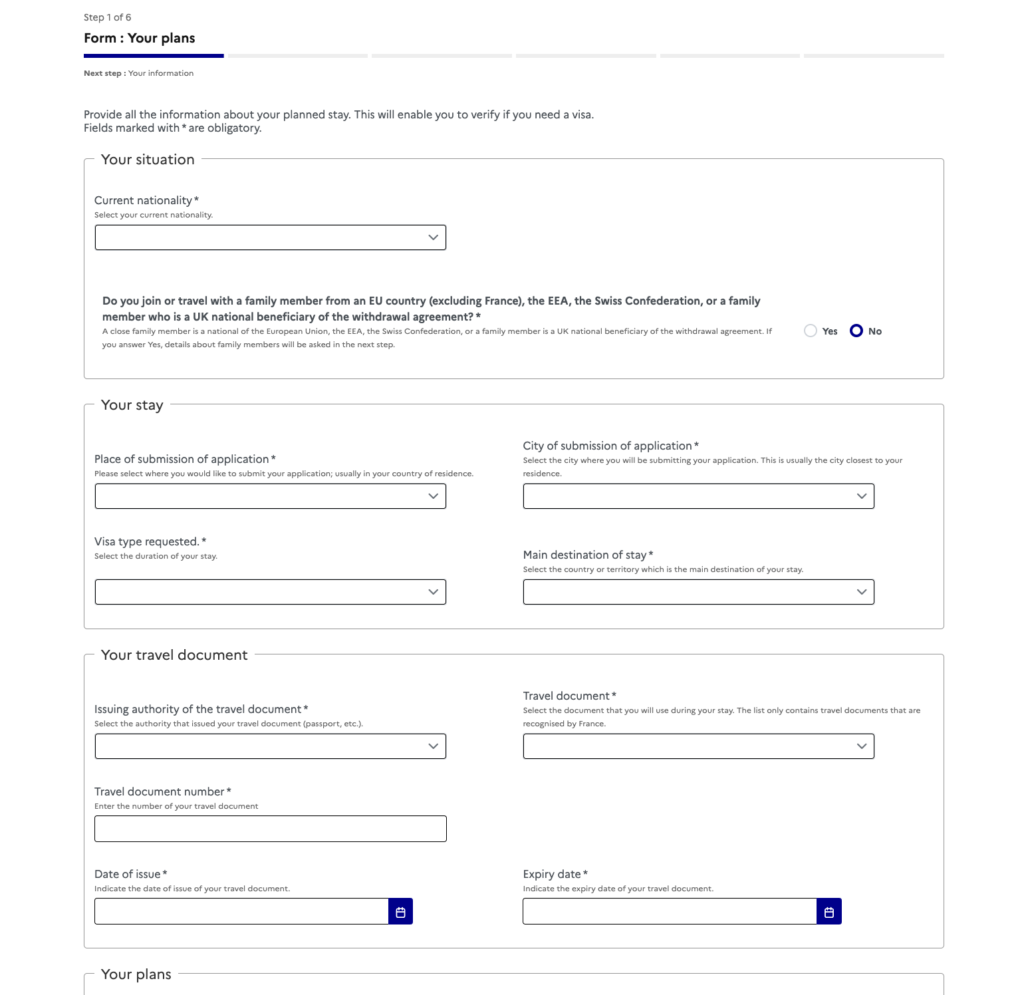
“Your stay” Section
In theory, you must be living in Canada to apply for a Working Holiday Visa to France. You can make an appointment with one of the four following VFS Global centres in Canada:
- Toronto
- Montréal
- Vancouver
- Ottawa
Most applicants will want to pick the nearest centre using the drop-down menu in “Place of submission of application.”
In visa type requested, you must choose Long stay (>90 days)
Note that the initial Working Holiday Visa allows Canadians to live in France for up to a year, but there are options to stay longer if you wish, for instance a second visa or a visa extension application once in France. That will be discussed more in the final chapter.
Pick your “Main destination of stay” in the drop-down menu. You can choose to stay in France or in one of the French-administered territories outside the European continent:
- France (including Corsica)
- Guadeloupe (Caribbean)
- Martinique (Caribbean)
- French Guiana (South America)
- Reunion (western Indian Ocean)
- Mayotte (western Indian Ocean)
- Saint Pierre and Miquelon (south of Newfoundland)
Working Holiday Visa holders are not eligible to live and work in the following French-administered territories: French Polynesia, Saint Barthelemy, New Caledonia, Saint Martin, Wallis and Futuna, and French Southern and Antarctic Lands.
“Your travel document” Section
The issuing country should be “Canada.” In “Travel document,” choose “regular passport.”
The “travel document number” is in the top right corner of the ID page, under “Passport No/No de passeport.” A Canadian passport number starts with two letters followed by six digits, e.g. AB123456. Make sure you don’t mix up “1” and “I,” “0” and “O.” If you’re typing the first two characters, you must enter letters, if you’re entering the six characters that follow, you must enter numbers.
Enter your passport’s date of issue and expiry.
“Your plans” Section
Working Holiday Visa applicants must select “Other” from the “Your plans” drop-down menu, then “Working Holiday” from the “Main purpose of stay” drop-down menu.
Click “Verify” at the bottom of the page. The page will reload with your information saved and a message will confirm that your situation indeed necessitates a visa. Click “Next”. A message will appear asking you to confirm your passport number. Once you’ve confirmed, you will move on to the next section, “Your information.”
“Your information” Section
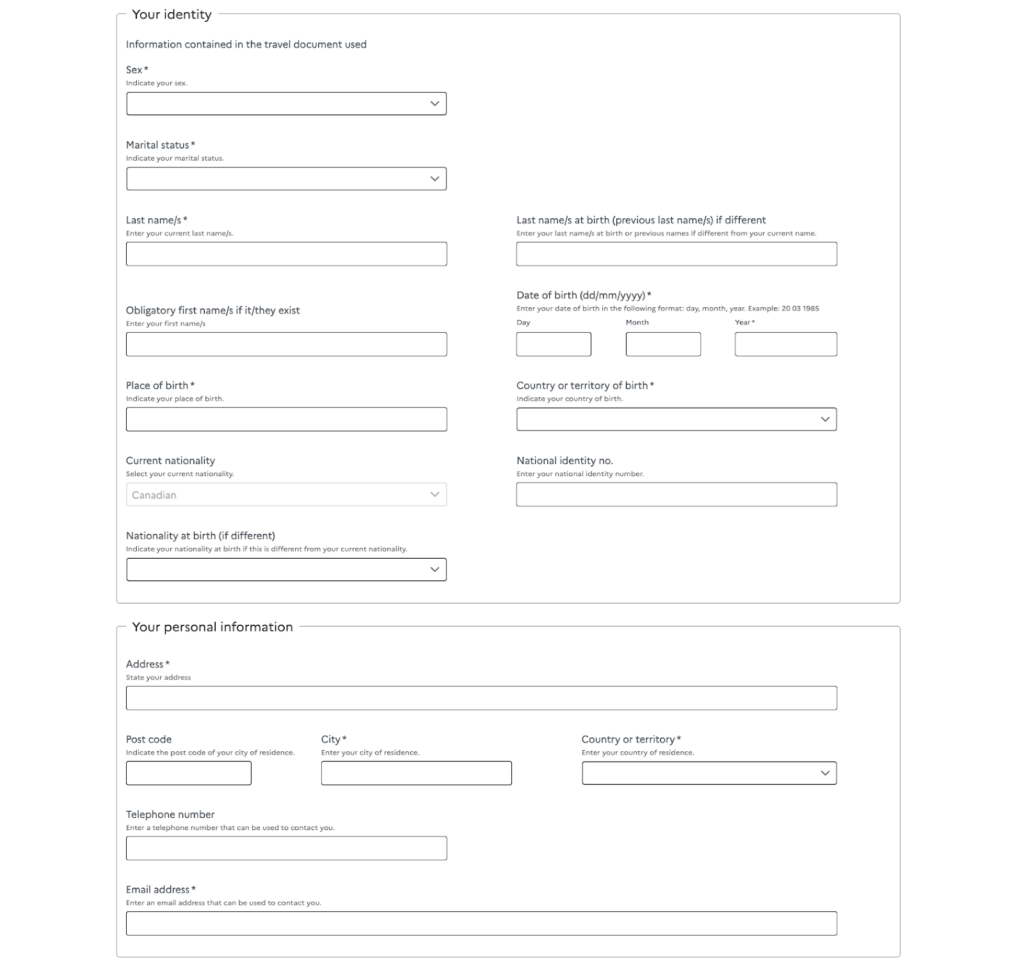
“Your identity” Section
Enter your information exactly as it appears on your passport, without using special characters. If you have a middle name on your passport, enter it as well, even if you don’t usually use it.
Canadian citizens don’t have a “National identity no”; this field is optional and it doesn’t apply to you. Don’t enter your SIN.
“Your personal information” Section
This section is straightforward, simply enter your residential address. Provide a phone number and email address in case you need to be contacted.
“Details of your identity” Section
Answer “Yes” if you do not currently live in Canada, “No” if you live in Canada.
“Your family” Section
You must answer two yes-no questions:
- Are any of your relatives French nationals? If “yes,” you must provide details, including your relationship with this person. If this person has a French carte d’identité (one of the official identity documents in France), you can enter their “national identity number,” or you can provide the person’s passport number.

- Do you have any family members who live in France? If “yes,” fill out the required fields. If you have several relatives in France, you may click “Add another person”.
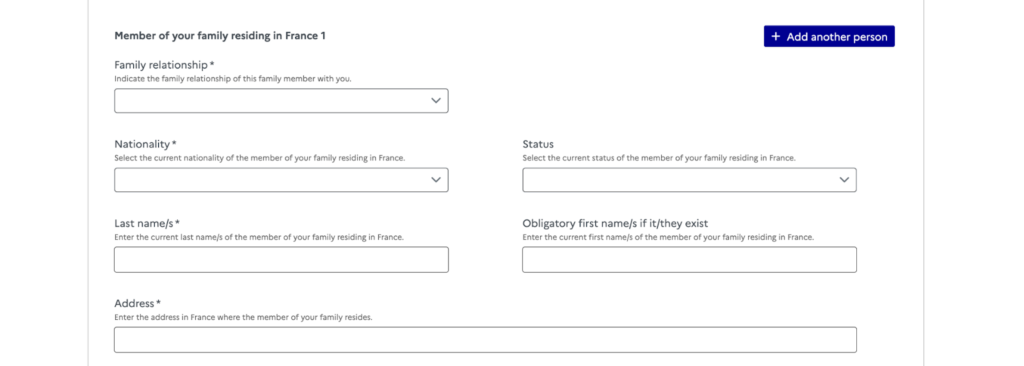
“Your job” Section
Select your current occupation from the drop-down menu:
- If you’re a student, choose “Student, trainee.”
- If you’re not currently working, choose “Unemployed.”
- If you’re working, look for the title that best matches your current job. If you can’t find it, select “Other” and provide details.
Remember that your current job (or lack thereof) doesn’t affect your Working Holiday Visa application—there’s no specific work experience requirement.
Once you’re done, click “Save” and “Next” to move on to the next section.
“Your last visa” Section

If you have never spent more than three consecutive months in France, mark “No” and click “Next”.
If you did spend more than three months in a row in France and held a visa, answer “Yes.” A new series of questions will ask for further details about the visa you had.
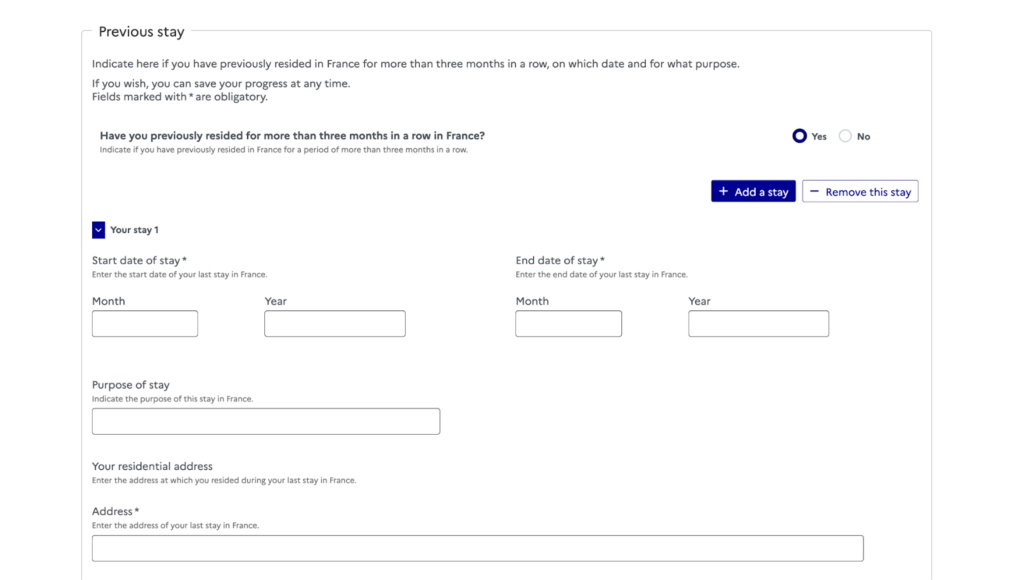
Provide the required information, including dates and purpose of your stay, as well as address in France (e.g. where you used to live).
If you took multiple three-month (or longer) trips to France, click “Add a stay.” When you’re done, click “Next.”
“Your stay” Section
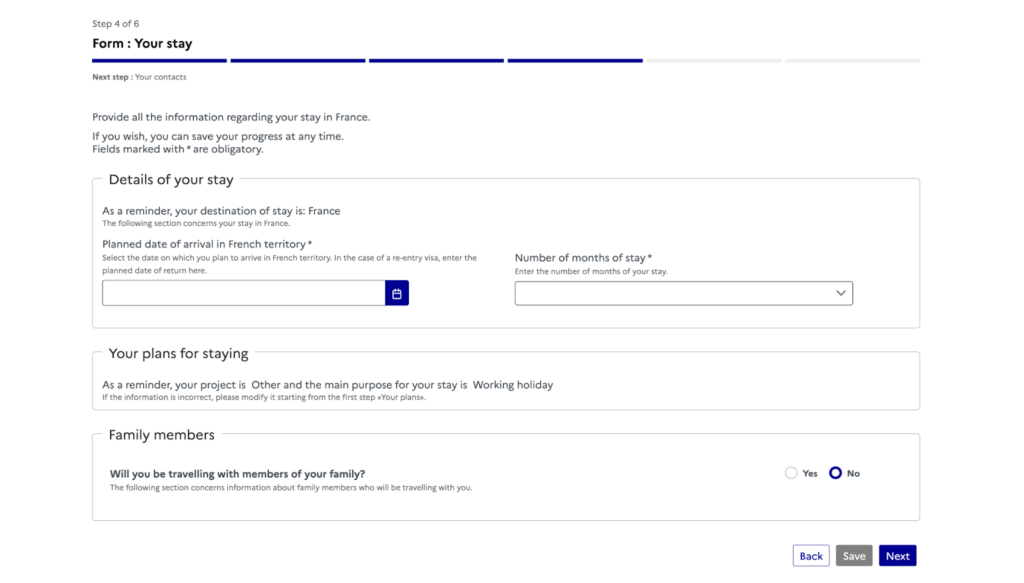
“Details of your stay” Section
Provide your planned arrival date in France. Note that it can be an estimated date, you are not obligated to fly to France on this exact date. However, the planned arrival date will be used by the Consulate General as the start date for your visa, valid for up to 12 months. It is therefore in your interest to set a realistic departure date, because your 12 months countdown timer begins when your visa says so, not when you actually land in France.
Use the drop-down menu to specify how many months you’re planning to stay in France. You don’t have to select “12,” you can pick any number between 3 and 12. If you state you’re not planning to stay in France for a year, the length of the Working Holiday Visa issued may reflect this. Remember that you must have insurance coverage for the entire length of your stay and that initially, you can stay up to 12 months. If you wish to stay longer, there are options to extend, but your first Working Holiday Visa will be issued for a maximum of 12 months.
“The purpose of your stay” Section
The first statement is just a reminder that you’re applying for a Working Holiday Visa. If it doesn’t say “Working holiday,” you’re not applying for the right visa.
The second question is about possible family members travelling with you. Family members must submit their own Working Holiday Visa application and satisfy requirements. Applications will be processed separately.
Once you’re done, click “Next.”
“Your contacts” Section
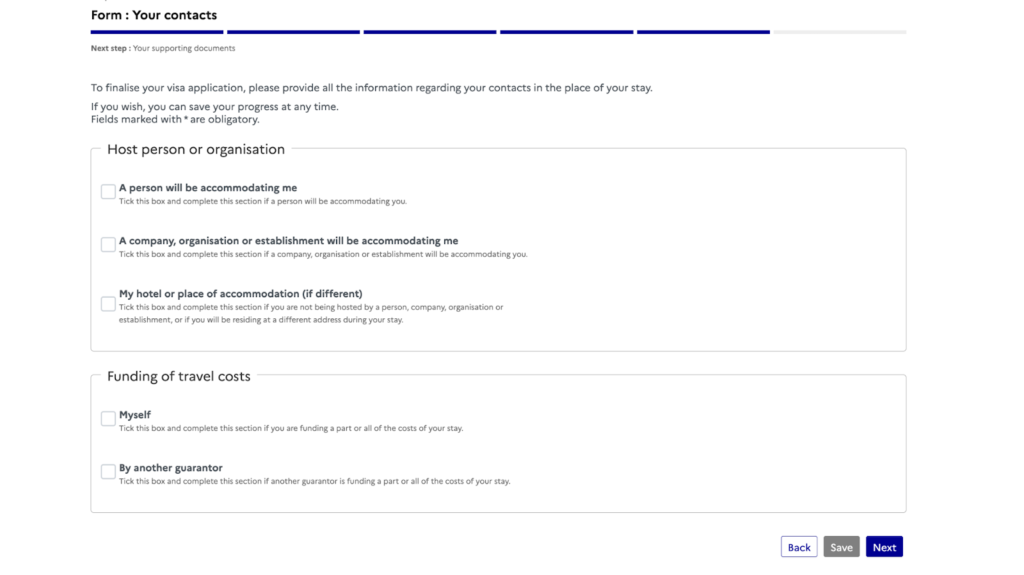
“Host person or organization” Section
You must provide a contact in France, for instance:
- A person (relative, friend, acquaintance)
- A company, organization or establishment
- A hotel or any other accommodation
You’re not required to have personal contacts or a long-term address in France. If you don’t know anyone in France yet, the best option is to provide the name of the place where you will stay first, for instance a hotel or a hostel. If you’re planning on staying with a host (e.g. Couchsurfing or Airbnb), ask if you can submit their contact info in your Working Holiday Visa application. They don’t have to vouch for you but they should be prepared in the unlikely event that they are contacted by the French government during a routine check on your application.
“Funding of travel costs” Section
In this section, you must give details on your travel budget, starting with who will cover the costs, i.e. yourself or a guarantor.
Either way, you have to specify how you will pay for various aspects of your trip:
- “Accommodation prepaid” means that you’ve already booked a place and paid for it.
- “Transportation prepaid” means you’ve already paid for your plane ticket.
- “Travellers’ cheques” is a way to carry funds with you.
- “Credit card” is way to pay for your expenses.
- “Cash” means that you will arrive in France with enough cash for all your expenses.
For instance, if you’re staying with a relative and relying on your savings for daily expenses, you can answer:
- “Myself,” then “Credit card”
- “By another guarantor” and “Accommodation provided”
“Your supporting documents” Section
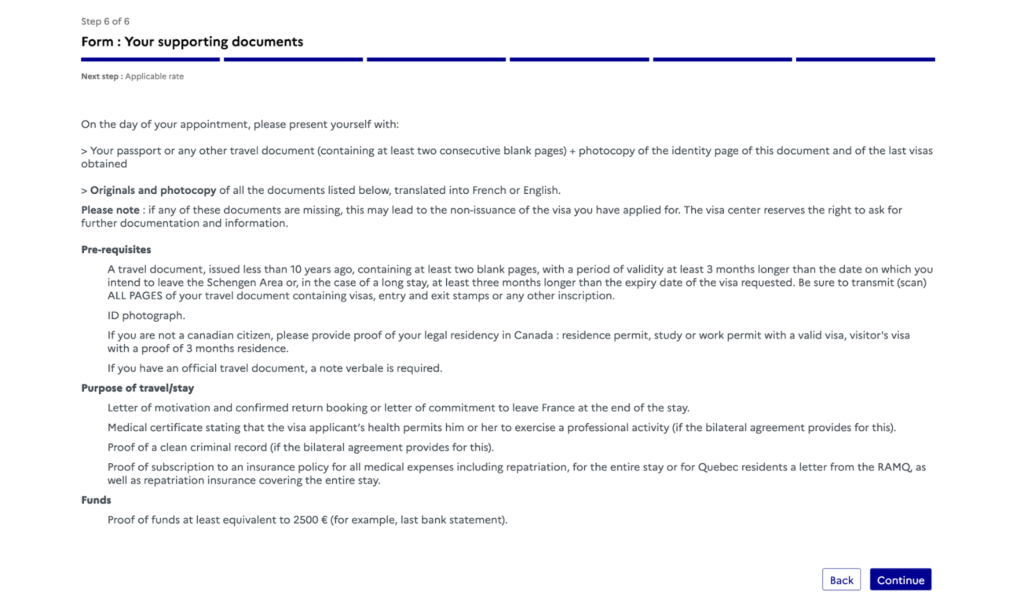
This is a list of all the documents you will need to provide.
You will also find the list of documents to attach to your application listed in a PDF document following the completion of this application form. Note that the France-Canada agreement does NOT “provide for” the following documents:
- Medical certificate
- Proof of a clean criminal record
As a result, you can SKIP THESE in your application.
Canadian applicants are exempt from the application fee charged by the French Consulate (separate from the ~CA$45 appointment fee that VFS charges). Applicants from other countries may be required to pay an application fee in euros or the equivalent in local currency.
Click “Continue”. You will be asked to confirm that all your information is correct and complete by checking the box on the left. By clicking “Continue” again, you will then see your finalized application to be printed and brought to your VFS appointment, which you can schedule now.












 Français
Français English
English













(68) Comments
Hi Jackson!
I’m applying of the WHV to France very soon, and it appears I will be unable to get the medical certificate or criminal record check in time. I see that you’re saying they’re not necessary, which is great news! However, the VFS appointment says I need them, and when I call they say it’s required. I’m wondering how to navigate this at my appointment?
Is it still true that I won’t need these documents? I’m having difficulty finding another government source stating that these aren’t required, I’m hoping to bring this with me as a reference to my appointment. Do you know where I can find this section of the agreement?
Thanks for the help!
Hi Farhang. If you are Canadian, then these are not required. You can read point 5 of the following article to understand why https://pvtistes.net/en/tips-applying-working-holiday-canadians-france/. I (and many others) got the WHV, and was never asked to show either document.
If you contacted VFS customer service, it’s possible they provided contrary information. They are outsourced employees in a third country (neither France nor Canada), so they may have just been reading the checklist back to you. In any case, VFS only takes the applications and forwards them to the French consulate for processing, so they don’t actual have any decision role in assessing applications.
Hi Jackson!
I had a question about the insurance cover and cover letter… I currently pay for Cigna Global Worldwide that renews on May 9 2026… I also bought a return flight on May 6 2026 as that was the cheapest option.
I can’t renew my insurance early of course, and it was so expensive that I don’t want to buy another cover… is it ok to state in my cover letter that I would like to spend part of 2026 in France and then stay longer than I intended? I will obviously renew my insurance in May of next year and I would only stay as long as my visa permits (I’ve had the Aus and England WHVs too and I’ve never overstayed and would never either).
Hi Safia. I don’t fully understand your question. What is your situation exactly? You are on your first WHV and want to apply for a second WHV next year? What cover letter are you talking about?
Hi there,
For the cover letter portion of the application how much information did you share about your itinerary and how thorough was your cover letter?
I currently don’t have an exact itinerary besides cities I’d like to visit and I’m afraid my application will be denied if I don’t share enough information.
I plan to write a basic cover letter stating: purpose of travel, intent to leave and financial means of support throughout the stay. Is there any other vital information that I should include(thorough itinerary, etc)?
Itinerary is not required. It’s enough to just explain your interest in France. But they don’t need to know your exact plan. Most working holiday makers don’t even have one themselves!
Hi, I’m currently in the process of waiting for a VFS appointment slot to open up.
The only thing I’m unsure of is do I need to bring proof of accommodation to the VFS appointment or can I book my accommodation once I’ve been granted a visa and in my hands?
Multiple tutorials are giving me varying instructions. Some say to book inward plane ticket/accommodation to show proof at the VFS appointment, some don’t. As I would like to buy a plane ticket AFTER I have my VISA in hand like you suggested, I’d like to preferably do the same (if possible) for my accommodation.
Besides the required docs that are on the registration form that France-Visas gives me is there anything else I need to bring as proof in order for a WHV Visa to be granted? (Accommodation, inward plane ticket, etc)
Thank you very much for the help!
Hi. If you look at your official checklist, neither proof of accommodation nor France-bound plane ticket is listed. I myself didn’t present either of them when I applied. The housing address is for reference purposes only and is not binding in any way.
Thanks for the reassurance! Appreciate the help.
Hi,
I am applying for the WHV from Toronto Ontario, I am in france right now for vacation waiting for my appointment at the VFS to get my WHV.
I finally found on appointment in Montreal because I never find any in Toronto.
I took that appointment but I saw after that on my application it says that my VFS is Toronto, can I still use Montreal to get it ? Do I need to change in my application and put Montreal instead of Toronto ?
I am going to fly back to Canada just for my appointment I just want to make sure I am doing the right thing
And after this appointment how long does it need to get the Visa ?
Thank you for your help !
Jorge
Hi Jorge. I’m not sure about this. I recommend that you contact VFS support to confirm. And please let us know here once you have the answer, thanks!
{{like.username}}
Loading...
Load more